3 Learning Type CEUs
Beyond Behavior: A Trauma-Informed Approach in BCBA® Practice
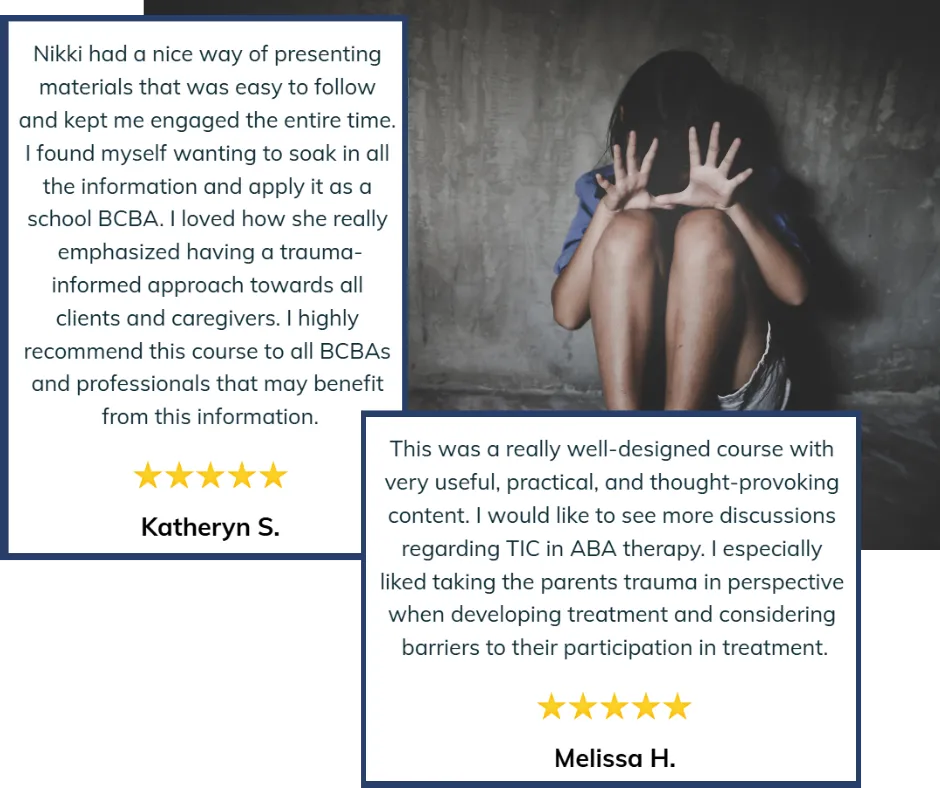

Instructors: Amelia Dalphonse, MA, BCBA and Nicole Dionne, MA, LCMHC, BCBA

Amelia Dalphonse, MA ,BCBA

Nicole Dionne, MA, LCMHC, BCBA
Why is A Trauma-Informed Approach in BCBA® Practice important?
When I initially began working with this 5-year-old, let’s call him Jacob, his severe behavioral challenges presented a steep learning curve.
Though his behavior often followed patterns, unpredictable outbursts and meltdowns arose triggered by seemingly innocuous stimuli. While the cause remained unclear at the time, it gnawed at me that there might be more to the story, a deeper pain beyond our immediate understanding.
Little did I know, just before our sessions began, Jacob had tragically lost his mother to a drug overdose.
This realization, though belated, shifted my perspective entirely. It became painfully evident that his challenging behavior was likely a
manifestation of unimaginable trauma, a silent cry for help amidst the overwhelming grief he couldn’t articulate verbally.
Reflecting on this experience reminds me of the crucial role understanding plays in effective intervention. Without recognizing the potential impact of trauma, my intervention could have unintentionally exacerbated his struggles.
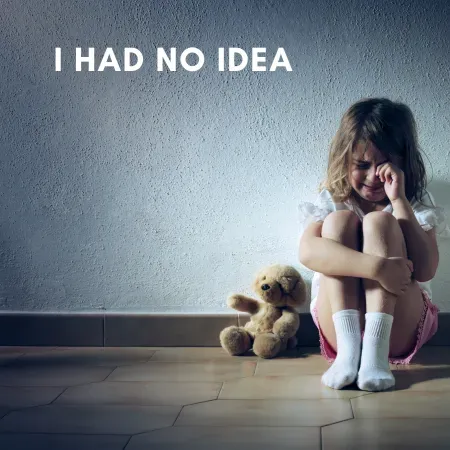
What you will learn:

Impact of Trauma
Understand the impact of Trauma on development

Definitions
Identify definitions of Trauma-informed care and Trauma

Research
Identify research in the field of ABA related to Trauma-informed care

Self-Assessment
Conduct a trauma-informed care self-assessment

Normalize Responses
Identify ways to normalize trauma responses when speaking to clients or collaterals

Practical Strategies
Utilize strategies that are trauma-informed or trauma-assumed
Why is Beyond Behavior essential?
Board Certified Behavior Analysts (BCBAs®) are often seen as architects of positive change, wielding strategies to address challenging behaviors and skill deficits. But there’s a missing piece in this equation: trauma.
Many clients BCBAs® work with carry invisible scars, their experiences shaping their responses in ways traditional behavior modification might miss. Yet, few ABA programs integrate trauma-informed care, an approach that acknowledges the impact of past experiences on behavior. This leaves BCBAs® navigating complex situations without essential tools. It’s like building a bridge without understanding the ground beneath.

Ethical Imperative: ABA providers have a responsibility to prioritize the well-being and dignity of their clients.
Neurodiversity affirming care aligns with this ethical obligation by valuing individual differences and promoting self-determination.
Improved Outcomes: Research shows that when neurodivergent individuals feel accepted and understood, they experience better mental health, increased self-esteem, and improved social connections.
Reduced Harm: Traditional ABA practices have sometimes been criticized for focusing on “normalizing” behavior, which can lead to internalized stigma and harm.
Neurodiversity affirming care shifts the focus to understanding and appreciating neurodiversity.
Client-Centered Approach: This approach prioritizes the individual’s goals, preferences, and strengths, leading to more meaningful and effective interventions.
Positive Social Impact: By embracing neurodiversity, we contribute to a more inclusive and accepting society for all.
Vulnerable clients are at risk!
Board Certified Behavior Analysts (BCBAs®) are often seen as architects of positive change, wielding strategies to address challenging behaviors and skill deficits. But there’s a missing piece in this equation: trauma.
Many clients BCBAs® work with carry invisible scars, their experiences shaping their responses in ways traditional behavior modification might miss. Yet, few ABA programs integrate trauma-informed care, an approach that acknowledges the impact of past experiences on behavior. This leaves BCBAs® navigating complex situations without essential tools. It’s like building a bridge without understanding the ground beneath.
Misdiagnosis and Missed Opportunities: Without understanding trauma’s impact, BCBAs® risk misinterpreting challenging behaviors, leading to interventions that miss the root cause and perpetuate the cycle of struggle. Imagine labeling a child’s emotional outburst as defiance when it’s actually a cry for help triggered by past trauma.
Re-traumatization and Broken Trust: Traditional behavior modification techniques, designed for different situations, can inadvertently re-traumatize clients with sensitive histories. This can erode trust, hinder progress, and exacerbate existing problems.
Wasted Resources and Ethical Concerns: BCBAs® without trauma-informed training struggle to navigate complex cases effectively, potentially leading to extended treatment times, increased costs, and ultimately, unfulfilled potential for clients. This raises ethical concerns, as BCBAs® have a responsibility to provide the most effective and appropriate care possible.

But that’s not the end of it—the problem’s actually worse than that! Failure to understand the impact of trauma on treatment can lead to:
Burnout and Compassion Fatigue: Unprepared BCBAs® suffer fatigue, harming care and increasing turnover, leaving clients worse off.
Widening Equity Gaps: Unknowing BCBAs® misinterpret cultural expressions, further disadvantaging vulnerable communities.
Public Distrust and System Breakdown: Failed interventions erode trust, leading to treatment disengagement and system breakdown.
Unless you know what’s really behind the behavior you might be making things worse!
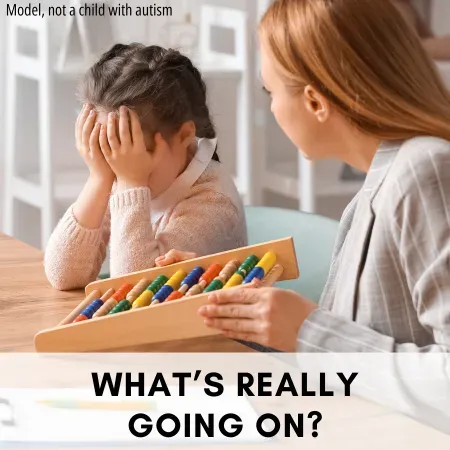
Trusted ACE Instructors Approved through the BACB
Quality Assurance You Can Trust: All of our instructors are certified Authorized Continuing Education (ACE) providers through the Behavior Analyst Certification Board (BACB). This ensures that our CEU courses meet the rigorous standards set by the BACB and qualify for CEU credits towards maintaining your BCBAs’® certifications.
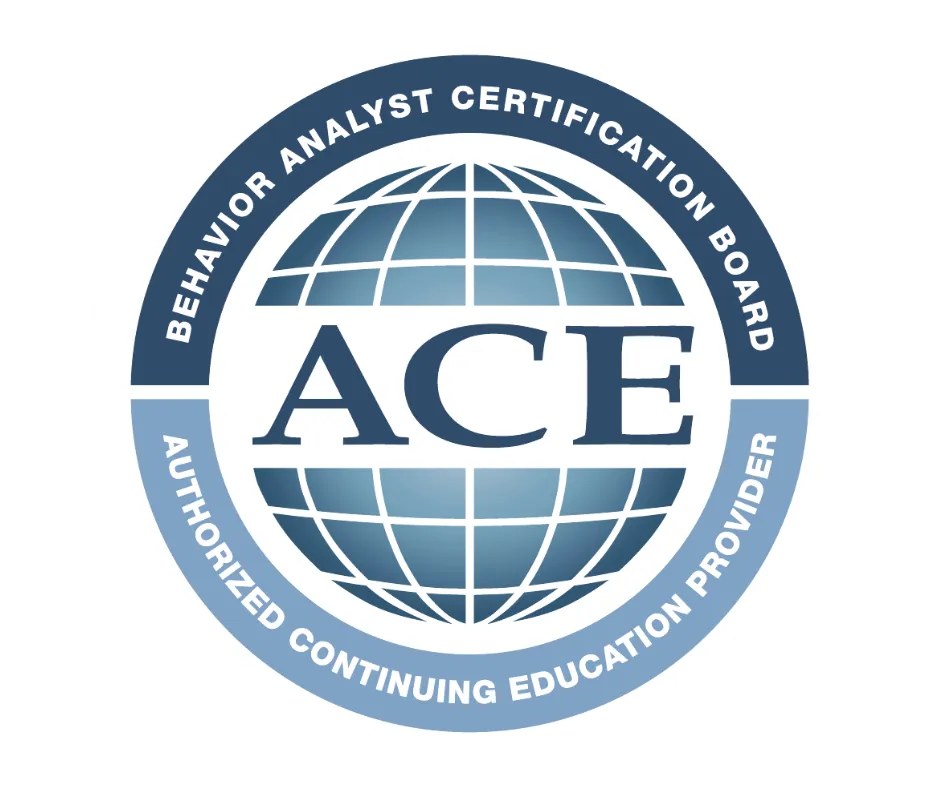
See what people are saying about Beyond Behavior

If you are new to the idea/concept of trauma informed care, then this course is a great place to start! If you've been studying trauma informed care and have put the foundational principals into practice then this is a great course to validate and refresh what you likely already know, but you won't necessarily learn anything new when it comes to TIC practices.
Marie E.
This course is a must for any ABA professional looking to integrate trauma-informed care into their practice. It bridges science and compassion, offering practical tools and real-world insight that elevate the way we support our clients.
Freya J.
I have seen an increase in my caseload being students who have trauma and how differently I need to approach supporting them and as well as service providers.
Julie A.
This was a really well designed course with very useful, practical, and thought provoking content. I would like to see more discussions regarding TIC in ABA therapy. I especially liked taking the parents trauma in perspective when developing treatment and considering barriers to their participation in treatment.
Melissa H.
This course was a great snapshot of what TIC is and how to incorporate the practice into an ongoing ABA program.
Kristen W.
This course is a must for any ABA professional looking to integrate trauma-informed care into their practice. It bridges science and compassion, offering practical tools and real-world insight that elevate the way we support our clients.
Freya J.
Nikki had a nice way of presenting materials that was easy to follow and kept me engaged the entire time. I found myself wanting to soak in all the information and apply it as a school BCBA®. I loved how she really emphasized having a trauma-informed approach towards all clients and caregivers. I highly recommend this course to all BCBAs® and professionals that may benefit from this information.
Katheryn S.
Behavior is the tip of the iceberg. It is communication of an unmet need. We, as BCBAs, need to arm ourselves with information that aligns with our humanity and compassion. We can't afford to look at behavior as something to extinguish no matter the cost to the individual and their families. We need to look beyond the behavior, and always keep in mind that, everyone is fighting a battle and we need to approach everyone using trauma-informed care mindset to truly impact our client's lives for the better.
Annet G.
Act now, and you can get 3 learning CEUs – plus get these exclusive bonuses!
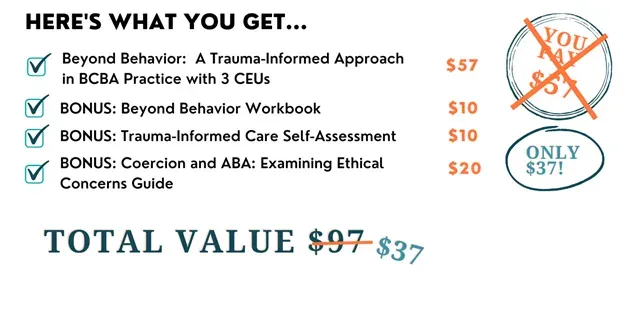

Meet the Instructors

Amelia Dalphonse, MA, BCBA
Amelia Dalphonse, MA, BCBA, co-founded Master ABA with her twin sister, Dianna Kelly, bringing over 13 years of expertise in Applied Behavior Analysis (ABA). Passionate about prioritizing client needs, Amelia earned a Master’s degree in ABA and became a Board Certified Behavior Analyst (BCBA®).
At Master ABA, Amelia and Dianna lead with innovation, emphasizing client-centered care to drive meaningful change. As an ACE provider, they’ve established the institution as a hub for progressive ABA practices, inspiring others to adopt compassionate and ethical approaches.
Through her role at Master ABA, Amelia advocates for advancing the ABA field with empathy and integrity. She stays abreast of the latest research, continuously seeking opportunities for professional growth.
Amelia’s leadership and dedication continue to shape the ABA community, empowering practitioners to prioritize client well-being. Together with her sister, she envisions a future where ethical values drive positive change in ABA practices.
Nicole Dionne, MA, LCMHC, BCBA
Nicole Dionne is a Licensed Clinical Mental Health Counselor based in Greenland, NH, with over 19 years of experience in the mental health field. She emphasizes the importance of collaborative relationships and acknowledges the inherent strength within each individual who seeks her guidance. Dionne’s primary objective is to create a secure environment conducive to processing and overcoming life’s stressors.

